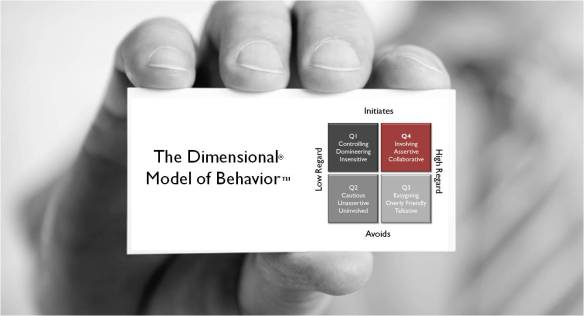Dealing With Workplace Incivility
Heather Heimbaugh, M.A.
Meghan R. Lowery, Ph.D.
Do you struggle with employees who are repeatedly absent, show little effort, never seem to go the extra mile, or neither seem satisfied nor committed to their jobs?
If you answered yes to any of these, you may have a problem with workplace incivility – but your employees may not be the one struggling!
Before you start pointing fingers and placing blame on the employees, consider whether these individuals are the real the problem. More often than we realize, these counterproductive behaviors occur in reaction to the work environment or organization’s leadership. Perhaps even your own leadership could be partially at fault. Remember, when you point one finger, there are four others pointing back at you.
Specifically, we find they are reacting to non-Q4 behaviors as defined by Psychological Associates’ The Dimensional® Model of Behavior™. Q4 behaviors are those that are involving, assertive, and collaborative. However, there are three other quadrants, as shown below, in which behaviors can fall as well, and those are the ones we find most troublesome in a work setting.
At this point you, or someone you know, may think, “Now, wait a minute! I am definitely not the problem. I may not be the picture of niceness all the time, but my employees do not need a friend, they need a boss. It is my job to make sure the work gets done, and if I have to occasionally raise my voice to make sure that happens, then so be it.”
There is a problem with this thinking. Even low intensity, seemingly benign behaviors like interrupting others, swearing, telling offensive jokes, conducting oneself unprofessionally, embarrassing others, subtly undermining others’ opinions, speaking condescendingly, using sarcasm, and rudeness – behaviors falling specifically in the Q1 quadrant of the Model – have the potential to produce negative consequences. These behaviors fit under the broader classification of workplace incivility, which includes any behavior that threatens the workplace norm for mutual respect, regardless of its intention.
Workplace incivility might seem relatively insignificant in the grand scheme of things compared to abusive supervision, workplace aggression, or harassment. However, it can create a great deal of stress for the target when it persists for a relatively long duration, occurs with great enough frequency, or manifests in varied or unpredictable ways.
The stress often results in a variety of consequences, many the same as those resulting from higher intensity, more openly aggressive behaviors. Furthermore, these consequences are not isolated to just the target. That is, even witnessing or hearing about workplace incivility can lead to the same negative consequences, such as:
- Damage to trust
- Retaliatory behaviors
- Tardiness and/or leaving work early
- An unwillingness to help out others or “go the extra mile”
- Decreased
- satisfaction with one’s supervisor, coworkers, and job
- organizational commitment
- perceptions of justice
- effort, productivity, and performance
- Increased
- job withdrawal
- turnover intentions
- prevalence of mental and physical health problems
Abolishing, or at the very least, lessening the prevalence of workplace incivility at your organization can help reverse many of these while encouraging improvements to organizational functioning and performance. By demonstrating Q4 collaborative behaviors, you can make a difference in the lives of your employees. The following are some techniques to help you begin:
- Team up with other leaders to set an example of the type of behavior you expect to see from employees in your organization.
- Ensure your interactions with peers are consistent with the behavior expected from others. Even if you know with certainty that your peer will not be offended by a joke or other unprofessional behaviors, others who might overhear the interaction may not feel the same.
- Always treat direct reports with respect. When they make mistakes, never say something that will make them feel badly. Instead, offer your support, and collaborate in creating a plans so the mistakes do not happen again.
- Give all negative feedback in private. Even if your feedback is constructive, calling out a person’s weaknesses in public can cause embarrassment.
- When you see something that constitutes uncivil behavior, take corrective action. Although you may be wary of issues not directly involving you, the worst thing you can do is ignore the situation. Workplace incivility builds off itself, and, if left unchecked, can transform into more overt and intentional aggression. Furthermore, if the incivility is allowed to permeate, it may become a part of the organization’s culture.
- Build positive relationships with other employees. Take time to get to know them as individuals.
- Be a respectful leader. Support a work environment that instills confidence, not fear and uncertainty. It is OK to be assertive, so long as it is balanced with respect and collaboration.
Learn how to deal with difficult people at the office
Learn how to work through office conflict
Learn about our award winning leadership development program
Schedule a complimentary Talent Development Direction session to address your issues






